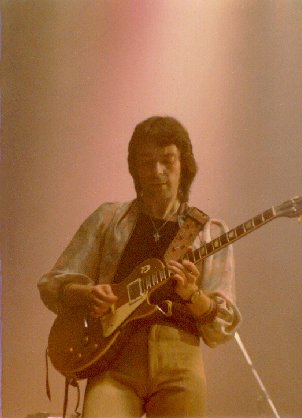On 8 October 1977, Genesis officially announced that guitarist Steve Hackett had left the band. His departure marked the second major loss in just two years, following Peter Gabriel’s exit in 1975, yet it also opened the door to a new chapter in the group’s history.
A gradual breaking point
By the summer of 1977, Genesis had just completed their massive Wind & Wuthering tour. Their live album Seconds Out was being mixed in London, capturing the band at their absolute peak as a live act. But behind the scenes, tensions had begun to surface.
Hackett, who had joined Genesis in 1971 and shaped their sound with his innovative, atmospheric guitar work, was feeling increasingly frustrated. Despite his growing contribution — from “Firth of Fifth” to “Blood on the Rooftops” — he felt overshadowed in the group’s tightly democratic structure.
During the Wind & Wuthering sessions, Hackett had asked for a guaranteed share of writing credits on each album, a proposal the others, especially Tony Banks and Mike Rutherford, declined. Genesis had always prided themselves on being a collective where only the best ideas made the cut. But for Hackett, that approach meant much of his music never left the rehearsal room.
“Talk to Mike, he’ll explain.”
While mixing Seconds Out in July 1977, Hackett reached his breaking point. Exhausted after months on the road and feeling creatively stifled, he phoned Mike Rutherford and told him he was leaving. Mike later recalled that he understood Hackett’s decision — he could sense the guitarist’s growing discontent — and didn’t try to persuade him otherwise.
A few days later, Phil Collins happened to drive past Steve near Trident Studios, where the band was working on the live album. Phil offered him a lift, but Steve declined. “Talk to Mike, he’ll explain,” he said, before walking away. When Phil arrived at the studio, Mike and Tony told him Steve had officially left the band.
Tony Banks later admitted, “I wasn’t surprised that he left, but I was surprised by the moment he left.” He’d just done Wind & Wuthering, where he had more of his material on an album than ever before so Tony thought he was happy. “But he’d done his solo album, and I think he got a taste for it.”1
Indeed, Hackett’s first solo record, Voyage of the Acolyte (1975), had given him both creative freedom and critical recognition. By 1977, he was eager to continue down that path.
A quiet departure
Mike Rutherford described Hackett’s exit as strange: “He just didn’t turn up one day.” The band simply carried on mixing Seconds Out without him. “He wanted to do solo work at a point where we felt the band hadn’t established itself enough to take a year off,” Mike said. “Had we all stopped then, it would have been hard to recreate the energy.”2
Hackett, meanwhile, felt a sense of relief. “I remember listening to “I Know What I Like” one day,” he said later. “We’d been playing it year in year out and we were mixing a live version of it. And I thought, I don’t know if I can actually face hearing this song one more time. I need a break from this.”3
Despite the suddenness of his departure, there was no public drama. Genesis released Seconds Out that autumn, now retrospectively seen as Hackett’s farewell album. On 8 October 1977, the news became official: Steve Hackett had left Genesis.
A new era begins
Compared to the shock of Peter Gabriel’s departure two years earlier, Hackett’s exit caused little turmoil within the band. Genesis regrouped quickly as a trio — Tony Banks, Mike Rutherford, and Phil Collins — and began work on their next album.
The result, …And Then There Were Three…, released in 1978, lived up to its name. It was the most accessible Genesis album to date and featured their first major hit single, “Follow You Follow Me.”
Tony Banks later reflected on Steves’s departure, “From the point of view of the band it was the least traumatic. I missed Steve in many ways, especially as a guitarist, but also, he was slightly more in my corner in terms of being a bit weird. I like to do things off the wall and he liked that too, whereas Mike and Phil were a bit more straightforward.”4
As for Hackett, he went on to build a long and varied solo career, releasing albums like Spectral Mornings, Defector, and Highly Strung, and even enjoying chart success with GTR in the 1980s. Looking back, he said leaving Genesis was the right move: “‘I wouldn’t have done Spectral Mornings, which is probably my best-loved album for fans.”5
The end of one chapter — and the beginning of another
Steve Hackett’s departure in 1977 quietly reshaped Genesis. The band streamlined their sound, moving toward a more direct songwriting approach that would soon bring them global fame.
And then, indeed, there were three.
Title photo: Photo of Steve Hackett performing with Genesis. January 17, 1977 in City Hall, Newcastle. Photo by John Bell. Source: Wikimedia Commons.
Sources
MIKE RUTHERFORD UNFILTERED: GENESIS GUITARIST/COMPOSER IN CONVERSATION.
Platts, Robin (2007): Genesis. Behind the lines, 1967-2007. Burlington, Ont., Canada: Collectors Guide Pub.
STEVE HACKETT FULL INTERVIEW- Revised : MY GENESIS YEARS.
TONY BANKS UNFILTERED: GENESIS KEYBOARD PLAYER & COMPOSER IN CONVERSATION . FULL.. 1 Hour 53 Mins.
Footnotes
- TONY BANKS UNFILTERED: GENESIS KEYBOARD PLAYER & COMPOSER IN CONVERSATION . FULL.. 1 Hour 53 Mins. ↩︎
- MIKE RUTHERFORD UNFILTERED: GENESIS GUITARIST/COMPOSER IN CONVERSATION. ↩︎
- Platts 2007: 99. ↩︎
- TONY BANKS UNFILTERED: GENESIS KEYBOARD PLAYER & COMPOSER IN CONVERSATION . FULL.. 1 Hour 53 Mins. ↩︎
- STEVE HACKETT FULL INTERVIEW- Revised : MY GENESIS YEARS. ↩︎

